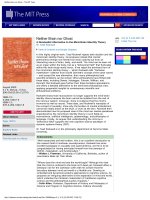the mit press corporate power in global agrifood governance jun 2009
Bạn đang xem bản rút gọn của tài liệu. Xem và tải ngay bản đầy đủ của tài liệu tại đây (1.74 MB, 329 trang )
edited by Jennifer Clapp and Doris Fuchs
CORPORATE POWER IN GLOBAL
AGRIFOOD GOVERNANCE
Corporate Power in Global Agrifood
Governance
Food, Health, and the Environment
Series Editor: Robert Gottlieb, Henry R. Luce Professor of Urban and
Environmental Policy, Occidental College
Keith Douglass Warner, Agroecology in Action: Extending Alternative
Agriculture through Social Networks
Christopher M. Bacon, V. Ernesto Méndez, Stephen R. Gliessman, David
Goodman, and Jonathan A. Fox, eds., Confronting the Coffee Crisis:
Fair Trade, Sustainable Livelihoods, and Ecosystems in Mexico and
Central America
Thomas A. Lyson, G. W. Stevenson, and Rick Welsh, eds., Food and the
Mid-Level Farm: Renewing an Agriculture of the Middle
Jennifer Clapp and Doris Fuchs, eds., Corporate Power in Global
Agrifood Governance
Corporate Power in Global Agrifood
Governance
edited by Jennifer Clapp and Doris Fuchs
The MIT Press
Cambridge, Massachusetts
London, England
© 2009 Massachusetts Institute of Technology
All rights reserved. No part of this book may be reproduced in any form by any
electronic or mechanical means (including photocopying, recording, or informa-
tion storage and retrieval) without permission in writing from the publisher.
This book was set in Sabon by SNP Best-set Typesetter Ltd., Hong Kong. Printed
and bound in the United States of America on recycled paper.
Library of Congress Cataloging-in-Publication Data
Corporate power in global agrifood governance / edited by Jennifer Clapp and
Doris Fuchs.
p. cm.—(Food, health, and the environment)
Includes bibliographical references and index.
ISBN 978-0-262-01275-1 (hardcover : alk. paper)—ISBN 978-0-262-51237-4
(pbk. : alk. paper)
1. Farm produce—marketing. 2. Agricultural industries. 3. International
business enterprises. 4. Globalization. I. Clapp, Jennifer, 1963– II. Fuchs,
Doris A.
HD9000.5.c67 2009
382'.41—dc22
2008042146
10 9 8 7 6 5 4 3 2 1
Contents
Series Foreword vii
Acknowledgments ix
Contributors xi
List of Acronyms xv
1 Agrifood Corporations, Global Governance, and Sustainability: A
Framework for Analysis 1
Jennifer Clapp and Doris Fuchs
I Corporate Power in International Retail and Trade
Governance 27
2 Retail Power, Private Standards, and Sustainability in the Global
Food System 29
Doris Fuchs, Agni Kalfagianni, and Maarten Arentsen
3 Certifi cation Standards and the Governance of Green Foods in
Southeast Asia 61
Steffanie Scott, Peter Vandergeest, and Mary Young
4 In Whose Interests? Transparency and Accountability in the Global
Governance of Food: Agribusiness, the Codex Alimentarius, and
the World Trade Organization 93
Elizabeth Smythe
5 Corporate Interests in US Food Aid Policy: Global Implications of
Resistance to Reform 125
Jennifer Clapp
II Corporations and Governance of Genetically Modifi ed
Organisms 153
6 Feeding the World? Transnational Corporations and the
Promotion of Genetically Modifi ed Food 155
Marc Williams
7 Corporations, Seeds, and Intellectual Property Rights
Governance 187
Susan K. Sell
8 The Troubled Birth of the “Biotech Century”: Global Corporate
Power and Its Limits 225
Robert Falkner
9 Technology, Food, Power: Governing GMOs in Argentina 253
Peter Newell
10 Corporate Power and Global Agrifood Governance: Lessons
Learned 285
Doris Fuchs and Jennifer Clapp
Index 297
vi Contents
Series Foreword
I am pleased to present the fourth book in the Food, Health, and the
Environment series. This series explores the global and local dimensions
of food systems and examines issues of access, justice, and environmental
and community well-being. It includes books that focus on the way food
is grown, processed, manufactured, distributed, sold, and consumed.
Among the matters addressed are what foods are available to communi-
ties and individuals, how those foods are obtained, and what health and
environmental factors are embedded in food-system choices and out-
comes. The series focuses not only on food security and well-being but
also on regional, state, national, and international policy decisions and
economic and cultural forces. Food, Health, and the Environment books
provide a window into the public debates, theoretical considerations,
and multidisciplinary perspectives that have made food systems and their
connections to health and the environment important subjects of
study.
Robert Gottlieb, Occidental College
Series editor
Acknowledgments
This book originated with a workshop held in Waterloo, Ontario, in
December 2006 on the theme of corporate power in global food gover-
nance. We would like to thank the Social Sciences and Humanities
Research Council of Canada, the Centre for International Governance
Innovation, and the Faculty of Environmental Studies at the University
of Waterloo for fi nancial support for that workshop. We are grateful to
Clay Morgan and Sandra Minkkinen at the MIT Press for shepherding
the project through the publication process, and to Robert Gottlieb and
three anonymous reviewers for providing helpful comments. We would
also like to thank Alex Bota, Matthew Bunch, Kim Burnett, Linda
Swanston, and Candace Wormsbecker for research and editorial assis-
tance. Finally, we would like to express our gratitude to the contributors
to this book, as well as to our families and friends, for their patience
and support throughout the publication process.
Contributors
Maarten Arentsen is Professor of Public Administration and Public Policy and
Managing Director of the Centre for Clean Technology and Environmental
Policy at the University of Twente, the Netherlands. His research focuses on
energy policy, energy market reform, and (green) energy innovation, with a
special focus on technological and institutional change. Among his recent publi-
cations are articles in Energy Policy, Policy Studies Journal, and Energy and
Environment.
Jennifer Clapp is CIGI Chair in International Governance and Professor of
Environment and Resource Studies at the University of Waterloo. Her current
research projects focus on the global political economy of genetically modifi ed
food, the politics of food aid reform, transnational corporations and global food
governance, and WTO agricultural trade negotiations. Among her recent books
is Paths to a Green World: The Political Economy of the Global Environment
(coauthored with Peter Dauvergne, MIT Press, 2005). She has also published
articles in Global Governance, Third World Quarterly, Journal of Environment
and Development, and Ecological Economics. She is coeditor of the journal
Global Environmental Politics.
Robert Falkner is senior lecturer in international relations at the London School
of Economics and associate fellow of the Energy, Environment and Development
Programme at Chatham House. His research interests are in international politi-
cal economy, with special emphasis on global environmental politics, multina-
tional corporations, risk regulation and global governance. His most recent
books are Business Power and Confl ict in International Environmental Politics
(Palgrave Macmillan, 2008) and The International Politics of Genetically Modi-
fi ed Food: Diplomacy, Trade and Law (Basingstoke: Palgrave Macmillan,
2007).
Doris Fuchs is Professor of International Relations and Development at the
University of Muenster in Germany. She received her PhD in Politics and Eco-
nomics in 1997 from the Claremont Graduate University and has since taught
at the University of Michigan, Louisiana State University, the University of
Munich, the University of Stuttgart, as well as the Leipzig Graduate School of
Management. Her primary areas of research are private governance, sustainable
development, food politics and policy, and corporate structural and discursive
power. Among her publications are Business Power in Global Governance and
An Institutional Basis for Environmental Stewardship, as well as articles in peer-
reviewed journals such as Millennium, Global Environmental Politics, Interna-
tional Interactions, Journal on Consumer Policy, and Energy Policy.
Agni Kalfagianni is assistant professor at the University of Stuttgart, Chair of
International Relations and European Integration. She has worked on the role
of private and public actors in fostering sustainability and transparency in the
food chain at the European and national (Dutch) levels. She has also published
articles on corporate social responsibility strategies in European food and agri-
cultural governance. Her main research interests include environmental policies
and politics, sustainable development, environmental ethics, and democratic
governance.
Peter Newell is Professor of Development Studies at the University of East
Anglia and James Martin Fellow at the Oxford University Centre for the Envi-
ronment. His most recent books include The Business of Global Environmental
Governance (with David Levy, MIT Press, 2005) and Rights, Resources and the
Politics of Accountability (with Joanna Wheeler, Zed, 2006). Among his other
publications are articles in Review of International Studies, Environmental Poli-
tics, Global Environmental Politics, Review of International Political Economy,
and Journal of International Development.
Steffanie Scott is Assistant Professor of Geography and Environmental Man-
agement at the University of Waterloo, Canada. She is involved in research on
the restructuring of local food systems in Vietnam. Among her publications are
articles in Agriculture and Human Values, Regional Studies, Urban Geography,
Women’s Studies International Forum, International Development Planning
Review, and Gender, Technology and Development.
Susan K. Sell is Professor of Political Science and International Affairs and
Director, Institute for International and Global Studies, at George Washington
University. She has published three books on the politics of intellectual property
—most recently Intellectual Property: A Critical History (coauthored with Chris-
topher May, 2005). She has published articles in International Organization,
International Studies Quarterly, Global Governance, and numerous law jour-
nals. Teaching and research areas include international political economy, inter-
national organization, nonstate actors, and international relations theory.
Elizabeth Smythe is Professor of Political Science at Concordia University
College of Alberta in Edmonton, Alberta. Her research has focused on the nego-
tiation of international trade and investment agreements and campaigns of
resistance to them. Publications include “Democracy, Development and the
Legitimacy Challenge: Assessing the Doha Development Round,” in Donna Lee
and Rorden Wilkinson, eds., Endgame at the WTO: Refl ections on the Doha
Development Round (Routledge, 2007), and “Legitimacy, Transparency and
Information Technology: The World Trade Organization in an Era of Conten-
tious Politics,” Global Governance 12 (2006) (with Peter J. Smith).
xii Contributors
Peter Vandergeest is Associate Professor in the Department of Sociology and
Centre for Asian Research at York University, Toronto. His research has been
organized around various dimensions of agrarian and environmental change in
in Southeast Asia and includes studies of both forestry and agriculture. His
current research takes up the history of alternative agriculture in Thailand and
controversies around the privatization of environmental regulation in the global
aquaculture industry.
Marc Williams is Professor of International Relations at the University of New
South Wales, Sydney. His current research focuses on transnational civil society,
trade politics, sustainable consumption, and the politics of genetically modifi ed
food. His most recent book (as coauthor) is Global Political Economy: Evolution
and Dynamics 2nd edition (Palgrave, 2007). Among his other publications are
articles in Geopolitics, Global Environmental Politics, Environmental Politics,
and Third World Quarterly.
Mary Young completed her PhD dissertation at York University on globaliza-
tion and agricultural restructuring in Indonesia. Her research interests include
transnational agrofood production, political economy, and ecological change,
particularly in Taiwan and Indonesia.
Contributors xiii
List of Acronyms
AAFC Agriculture and Agri-Food Canada
AAN Alternative Agriculture Network
AATF African Agricultural Technology Foundation
ABIA American Bio-Industry Alliance
ACT Organic Agriculture Certifi cation (Thailand)
ADDA Agriculture Development Denmark (Asia)
ADM Archer Daniels Midland
AP Associated Press
APRESID Asociación de Productores en Siembra Directa
ArPOV Asociación Argentina de Protección de las
Obtenciones Vegetales
ASA American Soybean Association
ASA Asociación de Semilleros Argentinos
AU African Union
BIO Biotech Industry Organization
BIOS Biological Innovation for Open Society
BIOTECanada Biotech Industry Organization Canada
BRC British Retail Consortium
BSE Bovine spongiform encephalopathy
CABC Canadian Biotechnology Advisory Committee
CAC Consumers Association of Canada
CAS Cámara Argentina de Semilleros
CASAFE Camara de Sanidad Agropecuaria y Fertilizantes
CBD Convention on Biodiversity
CCFL Codex Committee on Food Labelling
CEO Chief executive offi cer
CFIA Canadian Food Inspection Agency
xvi Acronyms
CGIAR Consultative Group on International Agricultural
Research
CI Consumers International
CIMMYT International Maize and Wheat Improvement Center
CONABIA Comisión Nacional Acesora de Biotecnología
Agropecuaria
COP Conference of the Parties
CSR Corporate social responsibility
DANIDA Danish International Development Agency
DFID Department for International Development (UK)
DNMA Dirección Nacional de Mercados Agroalimentarios
EC European Commission
ETI Ethical Trading Initiative
EU European Union
Eurep Euro-retailers Produce Working Group
FAB Foro Argentino de Biotecnología
FAC Food Aid Convention
FAO Food and Agriculture Organization
FBT Food, beverage, and tobacco
FCD Fédération des entreprises du Commerce et de la
Distribution
FDA Food and Drug Administration
FDI Foreign direct investment
FSC Forest Stewardship Council
FTA Free trade agreement
FWAG Farming and Wildlife Advisory Group
GAO Government Accountability Offi ce
GAP Good Agricultural Practices
GATT General Agreement on Tariffs and Trade
GFSI Global Food Safety Initiative
GlobalGAP Global Partnerships for Good Agricultural Practice
GM Genetically modifi ed
GMA Grocery Manufacturers Association
GMOs Genetically modifi ed organisms
GMP Good Manufacturing Practices
GPL General public license
GRAIN Genetic Resources Action International
Acronyms xvii
GTZ German International Development Agency
GURTs Genetic use restriction technologies
HACCP Hazard Analysis of Critical Control Points
IAASTD International Assessment of Agricultural Knowledge,
Science and Technology for Development
IATP Institute for Agriculture and Trade Policy
ICONE Institute for the Study of Trade and International
Negotiations
ICS Internal Control System
ICTSD International Centre for Trade and Sustainable
Development
IFOAM International Federation of Agricultural Movements
IFPRI Food Policy Research Institute
IFS International Food Standards
IGC Intergovernmental Committee on Intellectual
Property, Genetic Resources, Traditional Knowledge
and Folklore
IGC International Grains Council
ILSI International Life Sciences Institute
IMO Institute for Marketecology
INASE Instituto Nacional de Semillas
INGOs International nongovernmental organizations
IP Intellectual property
IPM Integrated pest management
IPR Intellectual property rights
IRRI International Rice Research Institute
ISAAA International Service for the Acquisition of
Agro-Biotech Applications
ISLI International Life Sciences Institute
ISO International Organization for Standardization
ITF International Task Force on Harmonization and
Equivalence in Organic Agriculture
IUPGR International Undertaking on Plant Genetic
Resources
KARI Kenya Agricultural Research Institute
M4P Making Markets Work Better for the Poor
mha Million hectares
xviii Acronyms
NAFTA North American Free Trade Agreement
NAWG National Association of Wheat Growers
NEPAD New Partnership for Africa’s Development
NGO Nongovernmental organization
NIEO New International Economic Order
OECD Organization for Economic Cooperation and
Development
PBRs Plant Breeders’ Rights
PCT Patent Cooperation Treaty
PhRMA Pharmaceutical Research and Manufacturers
Association
PIPRA Public Intellectual Property Resource for Agriculture
PR Public relations
PTO Patent and Trademark Offi ce (US)
PVP Plant Variety Protection
R&D Research and development
rDNA Recombinant DNA
RR Roundup Ready
RSC Royal Society of Canada
SAGPyA Secretaría de Agricultura, Ganadería, Pesca y
Alimentos
SENASA Servicio Nacional de Sanidad y Calidad
Agroalimentaria
SPLT Substantive Patent Law Treaty
SPS Sanitary and Phytosanitary Measures
TBT Technical Barriers to Trade
TNCs Transnational corporations
TRIPS Trade Related Intellectual Property Rights
UK United Kingdom
UNCTAD United Nations Conference on Trade and
Development
UPOV Union for the Protection of New Varieties of Plants
US United States
USAID United States Agency for International Development
USDA United States Department of Agriculture
U.S. PIRG United States Public Interest Research Group
Acronyms xix
USTR United States Trade Representative
USWA United States Wheat Associates
WETEC Wheat Export Trade Education Committee
WFP World Food Program
WHO World Health Organization
WIPO World Intellectual Property Organization
WTO World Trade Organization
1
Agrifood Corporations, Global Governance,
and Sustainability: A Framework for Analysis
Jennifer Clapp and Doris Fuchs
Fundamental changes have taken place in food systems around the world
over the past century. We now have a globally integrated food system
that affects all regions of the world. The recent volatility in food prices
has illustrated the global nature of this food system, highlighting the
ways developments in one part of the world can have multiple and wide-
ranging impacts. Transnational corporations (TNCs) have been central
actors in the development of this global food system. They dominate the
production and international trade in food and agricultural items, and
are also key players in the processing, distribution, and retail sectors.
Indeed, it is unlikely that the current global food system would exist as
it does today without the participation of TNCs. Many of these fi rms
operate in numerous countries and at more than one level along the
global food chain. As food systems around the world become increas-
ingly affected by the corporate-dominated global food system, we must
pause to consider the consequences of this fundamental change in the
provision of our food.
The international governance of the food system is geared toward pro-
viding some degree of regulation to put in place safeguards from potential
negative socioeconomic and ecological consequences of a globalized food
system. In many ways these rules govern activities of agrifood corpora-
tions, because these actors are pivotal agents in the globalization of the
food system. But at the same time, these corporations play a key role in
the establishment of the very rules that seek to govern their activities. This
includes infl uence over state-based and intergovernmental mechanisms of
governance, as well as private forms of governance. This situation raises
important theoretical and policy questions about the impact of corporate
infl uence on the sustainability—environmental as well as economic and
social—of the global food system and the rules that govern it.
2 Jennifer Clapp and Doris Fuchs
This book examines several key questions about the role of corporate
actors in the global food system. First, we ask what role corporations
are playing in the formation of the norms, rules, and institutions that
govern the global food system. In answering this question, we examine
the various facets of power that corporations exercise in an attempt to
infl uence rules by which they themselves must ultimately play, including
both state-based and private forms of governance. Second, we ask about
the wider implications of corporate power in global food governance for
the sustainability of the global food system as well as for societal debates
over sustainability in the global food system. In particular, we examine
the ways corporations use and infl uence the defi nition of the concept of
sustainability in their exercise of power in global food governance in
relation to other actors and other interpretations of the concept.
This book sits at the intersection of two emerging literatures on TNCs.
Recent years have seen a growing body of scholarship on transnational
corporations as actors in global governance (Fuchs 2007a; Cutler,
Haufl er, and Porter 1999; Cutler 1999; Sklair 2002). Grounded primar-
ily in political science and international political economy, this work
examines the political role of corporate and business actors in the estab-
lishment and implementation of norms, rules, and institutions governing
international political and economic interactions. Power, authority, and
legitimacy are central themes to this work. At the same time, a literature
has emerged on the role of TNCs in the global agrifood system (see, for
example, Glover and Newell 2004; McMichael 2005; Lang and Heasman
2004; Magdoff, Foster, and Buttel 2000; Heffernan 1998; Bonanno
et al. 1994). Grounded primarily in sociology and political ecology, this
literature examines the implications of growing corporate activity in the
food system. The impacts of corporate concentration and market domi-
nation on society and the environment have been key themes in this
literature.
Both of these literatures have been important in advancing our under-
standing of TNC activity in the global sphere. Yet while both focus on
TNCs as actors in the global political economy, there has been little
cross-referencing between these two literatures. As such there has been
little academic work that specifi cally examines the political role that
corporations play in efforts to govern the global food system. The litera-
ture on corporate actors in global governance has not yet examined the
food and agriculture industry in any signifi cant depth. The literature on
TNCs in the food sector has focused on market power, with an implicit
Agrifood Corporations, Global Governance, and Sustainability 3
assumption that economic dominance translates into political clout.
Market power is certainly important, but it does not capture all of the
facets of power that corporations can exercise in their bid to shape the
rules of the game. Given the current instability in the global food system
and the central role TNCs play in it, there is an urgent need for much
more systematic and comprehensive analysis of the political role that
corporate interests play in global food governance.
The framework we develop here identifi es different channels through
which corporations infl uence global food and agriculture governance and
examines the implications of that infl uence. By focusing on the intersec-
tion of TNCs and global food governance, the book aims to build on
the existing literature on TNCs and the global food system, as well as
on the conceptual literature on the role of corporations in global gover-
nance more broadly. A crucial contribution of this book is to unpack
the complex relationship between the exercise of power and the use of
the concept of sustainability in the governance of the global food
system.
Following a discussion of the rise of TNCs in the global food system
more broadly, this introductory chapter presents a conceptual frame-
work to help explain the role and implications of transnational corporate
involvement in the global governance of food and agriculture. The case
studies presented in this book have been selected to allow as comprehen-
sive an understanding of corporate involvement in global agrifood gov-
ernance as possible. They include investigations of corporate infl uence
with respect to standard setting by retail corporations, international food
safety standard setting, food aid policy, regulation of genetically modi-
fi ed organisms (GMOs), global biosafety governance, and trade-related
intellectual property rights rules. With this theoretically founded and
empirically comprehensive approach, this book seeks to make signifi cant
progress in our understanding of global agrifood governance and the role
of corporations in it.
Corporate Actors and the Rise of a Global Food System
The international trade in certain food and agricultural items has char-
acterized food systems for centuries. But the truly global scale of produc-
tion, trade, and marketing of food and agricultural products that we
have today really only developed in the past fi fty years (e.g., Busch and
Juska 1997; Magdoff, Foster, and Buttel 2000; McMichael 2000, 2005;
4 Jennifer Clapp and Doris Fuchs
Weis 2007). National food economies are increasingly integrated into a
global food system founded on ever-growing volumes and value of agri-
food trade. Although the share of agricultural trade in world merchan-
dise trade declined between 1980 and 1997 from 17 to 10 percent (Ingco
and Nash 2004, 5), the markets for global food and agriculture products
have grown markedly in absolute terms, and have become much more
globally integrated. There was a signifi cant increase in the value of global
agricultural trade overall during this period as well. The FAO reports
that international agricultural trade is expanding more rapidly than
world agricultural output (FAO 2005, 12).
At the same time that international trade in agricultural products has
grown, there have been shifts in its makeup both in terms of countries
and products. Over the 1971–2001 period, the growth in food imports
was most marked in developing countries, which saw a rise of 115
percent, compared to developed countries with a rise of 45 percent
(FAO 2004, 16). Developing countries were net agricultural exporters
in the 1960s, but now are net agricultural importers (FAO 2004, 14).
Since the early 1980s, trade in processed food also has grown more
quickly than trade in bulk commodities. Today, trade in processed
food products accounts for some 66 percent of agricultural trade (FAO
2004, 26).
Parallel to the growth in agricultural trade has been a growing partici-
pation of TNCs in the food and agriculture sector (Heffernan 2000;
Murphy 2006). Indeed, global trade in food and agricultural products
takes place largely among TNCs (FAO 2003). In the mid-1970s, there
was heightened concern over the increasingly global scope of the grain
trade and the power of corporate players in that trade (Morgan 1979).
Since that time, corporations have diversifi ed into multiple facets of the
food sector, including commodity trading, food processing and retailing,
as well as seed and agricultural chemical production (FAO 2003). TNCs
have been central players in the global integration of the food system.
They have stretched their operations both vertically and horizontally, to
the point that it no longer makes sense to speak of national food systems
because the agrifood TNCs are so globally integrated in their operations
(Heffernan 1998). As part of this globalization process, agriculture and
food have become commodifi ed through complex and global production
chains dominated by TNCs, which demand durable products and thrive
on distance, both social and physical, between the production and
consumption of food (Friedmann 1993, 1994; Kneen 1993).









